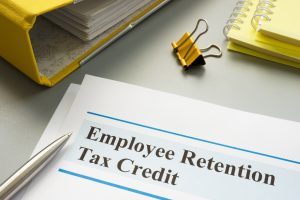IRS offers a withdrawal option to businesses that claimed ERTCs
 Some businesses are concerned about the validity of their claims for the Employee Retention Tax Credit (ERTC), a significant but complicated pandemic-related incentive. There are now potential repercussions of an erroneous claim in light of recent IRS warnings and pronouncements concerning the program. The IRS has responded by introducing a new ERTC withdrawal option for employers who already submitted claims.
Some businesses are concerned about the validity of their claims for the Employee Retention Tax Credit (ERTC), a significant but complicated pandemic-related incentive. There are now potential repercussions of an erroneous claim in light of recent IRS warnings and pronouncements concerning the program. The IRS has responded by introducing a new ERTC withdrawal option for employers who already submitted claims.
ERTC claims fraud
The ERTC is a refundable tax credit for companies that either:
- Continued to pay their workers during the pandemic shutdown in 2020 and 2021, or
- Experienced a notable decrease in gross receipts between March 13, 2020, and December 31, 2021.
Eligible companies may obtain credits of up to $26,000 per retained employee by submitting claims by April 15, 2025 (on updated returns).
Phony promoters and marketers rushed in with offers to assist firms in filing claims. They promised huge payouts in exchange for thousands of dollars in fees or a share of any reimbursements obtained. However, the IRS has discovered that many of these claims do not meet the credit’s rigorous conditions.
Taxpayers risk being responsible for promotional fees, fines, interest, and credit repayment for erroneous claims. Additionally, promoters might omit essential information, which could cause unsuspecting companies to experience a “domino effect of tax problems,” as the IRS puts it.
ERTC withdrawal option
The IRS has been taking more aggressive measures due to the surge of false claims. The agency declared in July 2023 that it would be reorienting its ERTC review focus to compliance issues, stepping up audits and criminal investigations of promoters and companies making questionable claims. It stopped the processing of new ERTC claims two months later.
The prohibition will remain in place until at least the end of 2023 because of “a flood of ineligible claims.” During the moratorium, the IRS will process valid claims submitted before September 14, but significantly more slowly. The IRS has increased the 90-day baseline processing target to 180 days. For claims with additional scrutiny or audit, it may take much longer.
However, the IRS claims that the moratorium isn’t stopping the con artists. According to sources, they have already changed their presentations to encourage employers to take out expensive upfront loans in expectation of delayed reimbursements when they submit ERTC claims.
The IRS has now made available to qualifying employers that have submitted claims but have yet to receive, pay, or deposit refunds a new alternative for withdrawal. Refunds, fines, and interest are not a concern for taxpayers who withdraw claims because they will be handled as though they have yet to be filed. (The IRS is also creating support for employers who were duped into filing an ERTC claim and have already been paid.)
The following situations allow you to withdraw:
- Filing the adjusted return only to claim the credit
- Requesting to cancel your whole ERTC claim
- Claiming the credit on an adjusted employment return (such as Form 941-X)
The specific procedures differ according to your situation, such as:
- Submitting your claim directly to the government or via a payroll provider
- Whether you were informed that you are being audited
- Whether you received a refund check you haven’t yet redeemed or deposited
Your withdrawal is only complete once you obtain an approval letter from the IRS, regardless of the relevant procedure.
Seek help
By submitting an amended return, taxpayers not qualified for the withdrawal process can lower or completely erase their ERTC claim. Even if your claim is withdrawn, you might still need to change your income tax return.
The IRS has insisted that taxpayers speak with “trusted tax professionals” despite warnings about possible ERTC problems. Do not hesitate to contact our RRBB advisors if you have questions regarding the ERTC. We can assist you in reviewing your ERTC claim and, if necessary, correctly withdrawing it if you’re having second thoughts.
© 2023
RRBB eNEWSLETTER
Get free tax planning and financial advice




